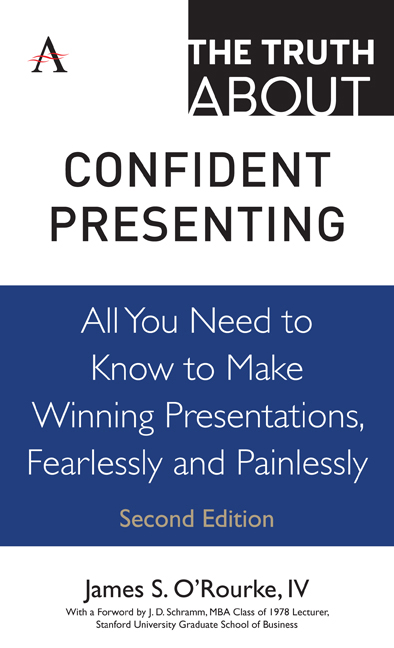 The Truth about Confident Presenting
The Truth about Confident Presenting Book contents
- Frontmatter
- Contents
- Foreword
- Introduction
- Part I Some Initial Truths
- Part II The Truth About Getting Ready to Speak
- Part III The Truth About What Makes People Listen
- Part IV The Truth About Developing Support for Your Presentation
- Truth 19 Develop support for your presentation
- Truth 20 Understand the power of your content
- Truth 21 The kinds and quality of evidence matter to your audience
- Truth 22 Structure can help carry an inexperienced speaker
- Truth 23 Find support for your presentation
- Truth 24 Use the Internet to support your presentation
- Part V The Truth About Getting Up to Speak
- Part VI The Truth About Managing Anxiety
- Part VII The Truth About Nonverbal Communication
- Part VIII The Truth About Visual Aids
- Part IX The Truth About Handling an Audience
- Part X The Truth About What Makes a Presentation Work
- References
- Acknowledgments
- About the Author
Truth 23 - Find support for your presentation
from Part IV - The Truth About Developing Support for Your Presentation
- Frontmatter
- Contents
- Foreword
- Introduction
- Part I Some Initial Truths
- Part II The Truth About Getting Ready to Speak
- Part III The Truth About What Makes People Listen
- Part IV The Truth About Developing Support for Your Presentation
- Truth 19 Develop support for your presentation
- Truth 20 Understand the power of your content
- Truth 21 The kinds and quality of evidence matter to your audience
- Truth 22 Structure can help carry an inexperienced speaker
- Truth 23 Find support for your presentation
- Truth 24 Use the Internet to support your presentation
- Part V The Truth About Getting Up to Speak
- Part VI The Truth About Managing Anxiety
- Part VII The Truth About Nonverbal Communication
- Part VIII The Truth About Visual Aids
- Part IX The Truth About Handling an Audience
- Part X The Truth About What Makes a Presentation Work
- References
- Acknowledgments
- About the Author
Summary
One of your most important tasks as a speaker is to select the type of evidence that is most likely to lead listeners to accept your point of view. So where do you find that material?
Broadly speaking, you have a choice between primary research and secondary research. Primary evidence is original or first-hand information that you gather yourself. Secondary evidence is all of the information gathered by other people. The main sources of primary research are interviews and surveys, while secondary research is available in literally hundreds of millions of library and online sources. As you consider the wealth of evidence available to you, think about what your audience will find most interesting, convincing and compelling. You're doing the research and gathering the evidence on their behalf.
The advantage of secondary research is, quite literally, that it's already been done for you. Professional librarians invest time and public resources thinking about what to archive, how to catalogue it, and how to help you find it. A good librarian, in fact, is worth his or her weight in gold; all you have to do is explain, in general terms, what you're looking for and he or she will help you with the rest. Your public or university library's reference desk is a great place to start. Just present yourself as an interested, curious reader and the librarian will take it from there.
Among the assets you'll find in just about any library are monographs and books, periodicals, newspapers, media and searchable databases. Libraries are famous for the number and quality of books they contain, but in many ways these are among the least useful of the resources you'll find there. The real problem with books and bound volumes is that most of them are simply outdated. The process of writing, editing, and publishing a book is so time-consuming that by the time it reaches library or bookstore shelves, the information is likely not as current as 23 you may need. But the advantage of books is that they are carefully researched, professionally edited, and for the most part tend to focus on one, coherent subject.
- Type
- Chapter
- Information
- The Truth about Confident PresentingAll You Need To Know To Make Winning Presentations, Fearlessly And Painlessly, pp. 89 - 92Publisher: Anthem PressPrint publication year: 2019


